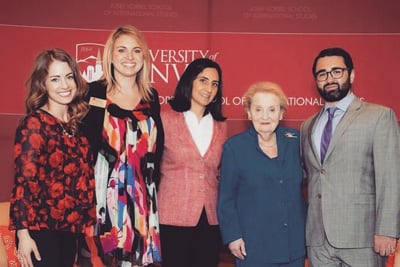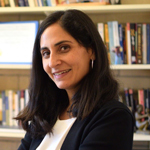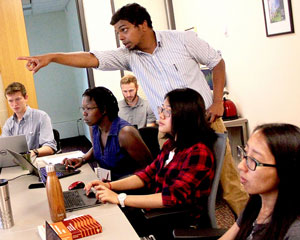2018 Graduate Education | International Affairs
THIS GUIDE IS NO LONGER ACTIVE. For the current FP Guide, click here.
University of Denver,
Josef Korbel School of International Studies

Josef Korbel School students with Acting Dean Pardis Mahdavi (center) and Madeleine Albright, the 64th U.S. Secretary of State and daughter of Josef Korbel
The Josef Korbel School of International Studies at the University of Denver is distinguished by its interdisciplinary approach to international affairs, and Pardis Mahdavi, acting dean, remembers when she first recognized the importance of taking a strongly interdisciplinary approach to teaching international affairs.
As a graduate student at another university, Mahdavi was taking a class in international relations taught by an acknowledged expert on Iran. Listening to the professor, she thought, “There’s something missing here. He’s not talking about what the people think, about the cultural changes going on now. He’s describing things that haven’t been my experience when I’ve been in Iran.”
After class, she approached the professor and asked him a question in Farsi. He said he didn’t speak the language. Then she asked him, in English, when he had visited Iran. “Oh, I’ve never been there,” he told her.
“That’s when I switched from international affairs to anthropology and sociology. I felt they provided me with more tools to understand a situation from different perspectives,” she says.

“The Josef Korbel School has an interdisciplinary orientation in everything it does, from curriculum to faculty research.” –Pardis Mahdavi, Acting Dean, Josef Korbel School of International Studies, University of Denver
Eventually, Mahdavi earned a master’s degree and PhD in anthropology and also a master’s degree in international affairs. Even so, that early experience as a graduate student has helped shape her priorities and goals as acting dean of the Josef Korbel School.
“Faculty must have interdisciplinary training to help students fully understand the most pressing issues of our time, including global economic inequities, violence, human trafficking, and climate change,” she says. Such complex problems require a comprehensive perspective to help identify what’s at play—to understand the roles of different constituencies and different approaches to power, violence, and oppression. Faculty also need to understand the effects of colonialism on a situation’s history.
Mahdavi, who has written books on human trafficking in Dubai and on Iran’s sexual revolution, came to the Josef Korbel School because of its interdisciplinary approach. “The school has an interdisciplinary orientation in everything it does, from curriculum to faculty research,” she says.
Currently, the school is taking a hard look at its curriculum and is building a core course requirement that Mahdavi says will look at the dynamics of difference and power. She adds, “We are also including a strong ethics component, so that students can engage with other individuals and cultures with an understanding of their own role—so they don’t set up a power dynamic that says, ‘My way is better than your way.’”
Mahdavi points to a current example of that way of thinking: The desire to “liberate” Muslim women from wearing a face veil. “Large numbers of women in the Middle East feel violated without a face veil and feel liberated wearing it. There needs to be an understanding of a culture without minimizing its richness,” notes Mahdavi.
 The Josef Korbel School has a large Washington, D.C., alumni group, and the school’s students are eligible for a Washington, D.C.–based program that includes supervised internships and coursework. Still, many set their sights on other career locations.
The Josef Korbel School has a large Washington, D.C., alumni group, and the school’s students are eligible for a Washington, D.C.–based program that includes supervised internships and coursework. Still, many set their sights on other career locations.
“Our students are out-of-the-box thinkers, who don’t necessarily want to work inside the Beltway,” says Mahdavi. A growing number of graduates favor Denver for its quality of life and because Colorado is home to a high number of nongovernmental organizations (NGOs) and nonprofits, including many in environmental and conservation organizations.
“Finding jobs for our students is easy,” says Mahdavi. “We have a 96 percent job placement rate.”
• MA, Conflict Resolution
• MA, Global Finance, Trade and Economic Integration
• MA, International Administration
• MA, International Development
• MA, International Human Rights
• MA, International Security
• MA, International Studies
• Master of Public Policy
• PhD in International Studies
• Dual-degree and certificate programs
Visit the Request Info page to receive more information.
Contents
- 2018 Graduate Education | International Affairs
- Johns Hopkins University, School of Advanced International Studies (SAIS)
- UC San Diego, School of Global Policy and Strategy (GPS)
- NYU School of Professional Studies, Center for Global Affairs
- University of Notre Dame, Keough School of Global Affairs
- Georgetown University, Walsh School of Foreign Service (SFS)
- SOAS University of London
- Yale University, Jackson Institute for Global Affairs
- University of Kent, Brussels School of International Studies (BSIS)
- Seton Hall University, School of Diplomacy and International Relations
- The Fletcher School of Law and Diplomacy at Tufts University
- University of Denver, Josef Korbel School of International Studies
- Arizona State University, Center on the Future of War

